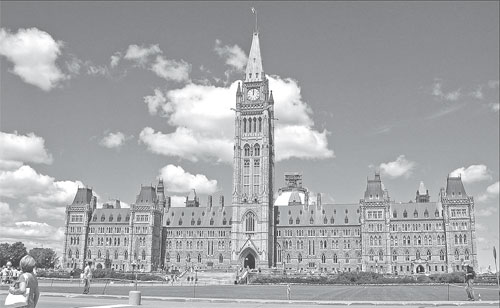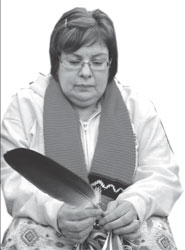Canada’s colonial oppression of its FIRST NATIONS
 Theresa
Spence, Chief of Canada’s indigenous Attawapiskat people, ended her
44-day fast from solid foods on January 24. Although her protest carried
out camped in a teepee near Canada’s House of Parliament, did not
achieve the aim of bringing together the Governor General, Prime
Minister and the Canadian First Nation leaders to discuss the aboriginal
or First Nations issues, it brought aboriginal leaders and opposition
politicians together to fight for a long list of priorities. Theresa
Spence, Chief of Canada’s indigenous Attawapiskat people, ended her
44-day fast from solid foods on January 24. Although her protest carried
out camped in a teepee near Canada’s House of Parliament, did not
achieve the aim of bringing together the Governor General, Prime
Minister and the Canadian First Nation leaders to discuss the aboriginal
or First Nations issues, it brought aboriginal leaders and opposition
politicians together to fight for a long list of priorities.
This protest is important to draw attention to the situation of the
indigenous people of Canada, the country that is today seeking to play a
role more in keeping with her geographical size and value of natural
resources than its respect for civilized behaviour, in teaching other
countries how to behave on matters such as human rights, accountability
and minority rights, than in actual practice in these important areas of
activity.
|

Canadian Parliament |
Canada has for some time been making strong criticisms of Sri Lanka
and opposed holding of the forthcoming Commonwealth Heads of Government
Meeting (CHOGM) here, based on alleged war crimes and violations of
humanitarian law in the operations to defeat the LTTE in May 2009. It
has ratcheted up on the opposition to Sri Lanka after the unverified
allegations in the Channel 4 videos, the highly questioned Darusman
report and the constant propaganda and campaigning by the pro-LTTE Tamil
lobby in Canada, which has the largest number of expatriate Sri Lankan
Tamils in the world today.
It is, therefore, interesting to know that while shouting out so much
about the treatment of Sri Lanka’s Tamil people, with little regard to
the context of an extended period of terrorism, in which all communities
in this country were affected; Canada is itself oppressing her own
important minority – the aboriginal or indigenous people Canada - known
as the First Nations. There is now strong evidence of gross violations
of treaty obligations signed by the British and Canadian Governments
with their leaders, carrying out moves to grab the natural resources on
First Nations lands, and also threatening the health and the very
existence of these people.
These anti-democratic acts and blatant violations of the rights of
the indigenous people of Canada has been raised in important sections of
the international media in recent weeks, in addition to them being taken
up at important international fora with moves for these to come up in
the United Nations, too. The Stephen Harper government is getting
increased flak over this treatment of the indigenous people both within
the country, and increasing concerns outside as the truths are exposed.
Indigenous community
The Guardian Weekly (04.01.13) had an important piece titled “Rising
anger of Canada’s First Nations” that exposed much of the harsh reality
under which these people live, in a country that is fast seeking to be
among the leading oil producers of the world.
Reporting on the fast launched by Attawapiskat Chief Theresa Spence,
Guardian writer Isabel Doucet from Montreal, quoted New Democratic Party
parliamentarian Charlie Angus stating that: “When images of Canada’s
First Nations people living in mouldy shacks and frosty tents, without
toilets or running water, emerged last year, Canadians were shocked. It
was Canada’s ‘Katrina moment.’… “A year on, progress has been
excruciatingly slow. The indigenous community received only 22 trailer
homes to deal with the housing crisis. A construction trailer with three
bathrooms and a kitchen still caters for around 50 people,” according to
Angus.
The Guardian Weekly reported that: “Many of Canada’s aborigines live
in what can only be described as developing-world conditions. Chronic
underfunding of essential social services and complete collapse of
infrastructure on reserves result in high mortality, unemployment,
substance abuse, suicide and incarceration.
“Early development is obstructed for children on reserves by a
bureaucratic financial hole that gives 30 percent to 50 percent less
educational funding than to other Canadian youngsters.
“Unrest is growing among Canada’s First Nations as the conservative
government makes sweeping changes to environmental protections and the
Indian Act, which many fear will fast-track the absolute surrender of
indigenous territory, terminate treaty rights and endanger land and
water in favour of economic gain.
“The past few weeks has seen the largest series of nationwide
protests in two decades, and last month a grassroots-led campaign under
the Twitter hashtag #IdleNoMore, saw thousands in over a dozen cities
across Canada, the US and UK take to the streets and call on Harper and
Governor General David Johnston to enter negotiations with Spence.
“Pamela Palmater, lawyer, professor and director of the Centre for
Indigenous Governance, believes the unprecedented changes to
legislation, combined with drastic cuts to native organisations, will
open up Canada’s indigenous lands to mineral extraction sell-offs to
China.
|

Canadian PM Stephen Harper |
“The spokesman for the minister of aboriginal affairs and northern
development was asked what consultation process was conducted with First
Nations before amending the Indian Act.
Jason MacDonald didn’t specify, but said the government conducts
“over 5,000 consultations with First Nations” every year. First Nations
chiefs across Canada disagree and after more than 250 of them wanting to
discuss the budget bill were denied entry to the house of commons in
early December, some rallied behind a grass-roots campaign, Idle No
More.
Charlie Angus is quoted stating that frustration and anger have built
up for a long time as communities feel they are moving backwards while
the government’s attitude is increasingly dismissive and derogatory,
“like a colonial power treating First Nations like a hostage
population”. The budget bill dismantles a 130-year-old environmental law
removing from federal oversight 99.7% of Canada’s 32,000 major lakes and
over 99.9 percent of Canada’s more than 2.25m rivers.
This will disproportionately affect First Nations, as decades of
underfunding and neglect have left 73% of all water systems and 65% of
waste water systems on reserves at medium to high risk.” (Guardian
Weekly Jan 04-10.2013)
What is significant is that the Stephen Harper government is going
about this major attack on the First Nations, despite the
constitutionally protected rights to be consulted and accommodated on
any developments that could cause irreversible damage to their lands. It
seems evident that the Conservative government of Stephen Harper has
little respect for the constitutional rights of the Canada’s First
Nations.
Tearing up of treaties
The background to the crisis now facing the indigenous people of
Canada was clearly explained by The Economist (Jan 19, 2013) in an
important piece under its Americas section titled “Time we stop meeting
like this”. It explained how, “Back in the 18th century British and
French settlers in what is now Canada secured peace with the indigenous
inhabitants by negotiating treaties under which the locals agreed to
share their land in return for promises of support from the newcomers.
This practice continued after Canada became self-governing in 1867.
These treaty rights were incorporated into the 1982 constitution. The
Supreme Court has since said they impose on the federal government “a
duty to consult” the First Nations (as the locals’ descendants prefer to
be called) before making any changes that impinge on their treaty
rights.”
The Economist reports that: “The Assembly of First Nations, which
represents about 300,000 people living in 615 different reserves,
reckons Stephen Harper’s Conservative government has broken the bargain.
In protests over the past month they have blocked roads and railways,
staged impromptu dances in shopping malls and chanted outside the office
of the prime minister”….which led to Chief Theresa Spence’s, refusal of
solid food since December 11, last year.
|

Theresa Spence is the chief of the Attawapiskat First Nation in
Canada |
“The spark for the protests was the government’s omnibus budget bill,
approved last month. With a majority of seats in both the House of
Commons and the Senate, Mr Harper’s government has grown used to passing
legislation without amendment over the objections of the opposition
parties. The budget act is a 414-page whopper that changes 64 acts or
regulations, including the Indian Act of 1876, while also watering down
federal environmental protection. The First Nations revile the Indian
Act, a paternalist law that governs many aspects of life on reserves,
including education, health care and commerce. But they insist they
should be consulted before it, and other laws that affect them, are
changed.
“If you want our First Nations to continue to hold up their end of
the bargain in terms of our treaty rights, it is very important that our
Canadian government not make unilateral decisions, because the treaties
were made nation to nation,” Simon Bird, a Cree vice-chief, told a
parliamentary committee in November. A small number of chiefs were later
stopped from pushing their way into the House of Commons to speak on the
budget bill. So they opted to organise demonstrations.
Separately, in November four women in Saskatchewan began a protest
over what they saw as the erosion of treaty rights, under the slogan
“Idle no More”. This grassroots protest has spread: it is partly
directed at the chiefs themselves, who are quarrelsome, divided and, in
some cases, seen as being out of touch.
As The Economist reports, Mr Harper got off to a promising start with
the First Nations and Canada’s other aboriginal groups, the mixed-race
Métis and the Arctic Inuit, when he issued an apology in June 2008 for
the treatment their children had suffered in residential schools (they
were separated from their families and often abused). The prime minister
promised a new relationship based on “collective reconciliation and
fundamental changes”.
That raised hopes that have yet to be fulfilled. The largely unspoken
issue behind the protests is that the Indian Act is long overdue for
replacement. Its conditions are cumbersome, and make it hard for First
Nations to attract outside business and income. It sets up a different,
and some would say, inferior, class of citizenship. While some reserves
have successful economies, others such as Attawapiskat, have appalling
housing and lack running water. The leak of an audit of the Attawapiskat
reserve that showed questionable financial practices may have been a
crude government effort to discredit Ms Spence. But it was a reminder
that not all the C$8 billion ($8 billion) budgeted for aboriginal
affairs is well spent.
It seems evident that the Conservative government is using the
interests that some (very few) chiefs have in keeping the broken system
going, to serve its own interests of exploiting the First Nations and
other indigenous people, and depriving them of their rights under treaty
obligations and principles of Universal Human Rights.
According to The Economist, polls suggest most Canadians do not think
the First Nations’ grievances are very important. Many might argue that
they would do better to assimilate with the rest of Canada. Yet, under
the developing situation such assimilation is not an immediate
possibility.
As it reports, “That is less likely to happen now than in the past:
exploration for minerals, oil and gas on their territories has given the
First Nations leverage over companies and governments. With their
constitutional rights to consultation and the accommodation of their
interests, the First Nations can tie resource projects up in legal knots
for years. These have already ensnared Northern Gateway, a proposed
pipeline to carry Albertan oil to the Pacific coast. And it may also
happen in the Albertan tar sands themselves.
That is one reason why staying on bad terms with its aboriginal
citizens is a foolish choice for a government which wants to boost
investment in natural-resource development. Another is that on January
8th a federal court ruled that 200,000 Métis and 400,000 First Nations’
people living outside reserves should also be considered to be Indians
under the constitution. If upheld by the Supreme Court, this will cost
the federal government money. The protests may be messy and discordant,
and involve only a small minority of Canadians. But they cannot be
ignored.” (The Economist – Jan 19-25, 2013)
What is significant today is that the new activism of the First
Nations of Canada must be seen in the role that Canada is seeking to
play as a major defender of human rights in other parts of the world.
Its increasing criticism of Sri Lanka on matters of human rights and
alleged violations of humanitarian law and tradition arises mainly from
what is alleged to have taken place in the final months of the necessary
military operation to defeat what was recognized as an international
terrorist organization, and the most ruthless of such groups.
What is being exposed today is how Canada treats its own minority
indigenous people, in the absence of any militancy or violence among any
sections of these people, and its attempts to totally disregard the
obligations imposed by the treaties signed by those original people of
Canada, first with the British Crown and later the Government of Canada,
which remains a member of the Commonwealth, with the Queen of England as
its sovereign.
This also draws the United Kingdom to this mounting dispute over the
rights of Canada’s First Nations, raising important questions as to the
worth and value of these treaties signed by the British Crown with the
people of Canada, in exchange for the limited rights over their
traditional lands.
The situation is now made more serious with the developments in
regions such as Alberta, where its enormous resources of oil sands are
to be exploited for oil that can make Canada among the largest producers
of fossil fuel in the world. But there is mounting opposition to this
among the indigenous people who have to suffer the most sacrifices for
this pursuit of energy by the Canadian authorities and foreign
investors. It is in the lands of the First Nations that most of these
oil sands resources are found. New research by reputed scientists have
shown the threats to the present and future living conditions of the
indigenous people, whose rights over their land are fast being
threatened.
Tipping Point
For years, residents of the northern Alberta community of Fort
Chipewyan, down the Athabasca River from the oil sands, have been
plagued by rare forms of cancer. They were concerned that toxins from
oil sands production might be to blame. Industry and government,
meanwhile, claimed production in the oil sands contributed zero
pollution to the Athabasca River.
But in 2010, new and independent research measured pollution in
waters flowing through the oil sands and discovered higher-than-expected
levels of toxins, including arsenic, lead and mercury, coming from
industrial plants. Leading the research was renowned freshwater
scientist Dr. David Schindler. At the same time, the leaders of tiny
Fort Chipewyan took their battle to the boardrooms of global oil
companies, demanding change.
The struggle of the indigenous people against the oil sands
exploitation, and the dangers this causing to the indigenous people
through increasing illness, and genetic dangers too, have been well
documented in Tipping Point: The Age of the Oil Sands (by Clearwater
Media) is a two-hour visual tour de force, taking viewers inside the
David and Goliath struggle playing out within one of the most compelling
environmental issues of our time, which was recently shown on Australian
TV and is drawing increased attention the world over.
The storm of controversy over the oil sands issue with the related
threats to the lands and lifestyles of the First Nations and other
indigenous communities of Canada, has created a whole new storm over
Canada’s treatment of its indigenous people, and the apparent disregard
it has for the protection of the environment at a time when the world is
thinking more about the dangers of Climate Change and the need for
Sustainable Development.
The rapidly emerging reality is that Canada, far from being a
defender of human rights and humanitarian values it is positioning
itself is one of the most dangerous threats to the humanitarian
traditions of civilized society, especially its contempt for the rights
of its own indigenous people and for worldwide concerns about the
exploitation of oppressed people.
Far from the liberator of people and societies it seeks to present
itself to the world today, it is in fact being exposed as bringing out
the worst of colonial exploitation within its own borders, in the
oppressive control of its original inhabitants – the First Nations. |







